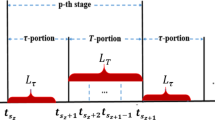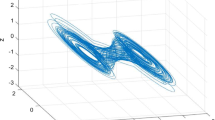Abstract
Deficiencies of the performance-based iterative learning control (ILC) for the non-regular systems are investigated in detail, then a faster control input updating and lifting technique is introduced in the design of performance index based ILCs for the partial non-regular systems. Two kinds of optimal ILCs based on different performance indices are considered. Finally, simulation examples are given to illustrate the feasibility of the proposed learning controls.
Similar content being viewed by others
References
S. Arimoto, S. Kawamura, F. Miyazaki. Bettering operation of robotics by learning[J]. Journal of Robotic System, 1984, 1(1): 123–140.
Z. Qu. Model-based learning controls and their comparisons using Lyapunov direct method[J]. Asian Journal of Control, 2002, 4(1): 99–110.
W. Tommy, S. Chow, Y. Fang. An iterative learning control method for continuous-time systems based on 2-D system theory[J]. IEEE Transactions on Circuits & Systems, 1998, 45(6): 683–689.
M. Q. Phan, J. A. Frueh. Design of learning controllers based on an auto-regressive representation of linear system[J]. Journal Guidance, Control, and Dynamics, 1996, 19(2): 355–362.
S. Gunnarsson, M. Norrlof. On the design of ILC algorithms using optimization[J]. Automatica, 2001, 37(12): 2011–2016.
M. Norrlof. An adaptive iterative learning control algorithm with experiments and industrial robot[J]. IEEE Transactions on Robotics and Automation, 2002, 18(2): 245–251.
J. A. Frueh, M. Q. Phan. Linear quadratic optimal learning control[J]. International Journal of Control, 2000, 73(10): 832–839.
N. Amann, D. H. Owens, E. Rogers. Iterative learning control for discrete-time systems with exponential rate of convergenceng[J]. IEE Proceeding-Control Theory and Applications, 1996, 143(2): 217–224.
J. Lee, K. Lee, W. Kim. Model-based iterative learning control with a quadratic criterion for tim-varying linear systems[J]. Automatica, 2000, 36(5): 614–657.
S. Yang, X. Fan, Z. Qu. Designing of guaranteed cost iterative learning algorithms based on LMI method[J]. Acta Automatica Sinica, 2006, 32(4): 578–585.
M. Sun, B. Hunag. Iterative Learning Control[M]. Beijing: Press of National Defence Industry, 2000.
J. Wang, T. Chen, B. Huang. Multirate sampled-data systems: Computing fast-rate models[J]. Journal of Process Control, 2004, 14(1): 79–88.
D. Li, S. L. Shah, T. Chen, et al. Application of dual-rate modeling to CCR octane quality inferential control[J]. IEEE Transactions on Control System Technology, 2003, 11(1): 43–51.
R. D. Gudi, S. L. Shah, M. R. Gray. Multirate state and parameter estimation in an antibiotic fermentation with delayed measurements[J]. Biotechnology and Bioengineering, 1994, 44(11): 1271–1278.
B. Friedland. Sampled-data control systems containing periodically varying members[C]//Proceeding First Congress International Federation of Automatic Control. London: Butterworths Scientific Publishers, 1960: 139–146.
Author information
Authors and Affiliations
Corresponding author
Additional information
This work was supported by the National Natural Science Foundation of China (No.60774023) and Hunan Provincial Natural Science Foundation (No.06JJ50141).
Shengyue YANG received his Ph.D. degree in Control Theory & Control Engineering from Central South University, China, in 2004. He is an associate professor at the School of Information Science and Engineering. His main research interests are learning and adaptive control, robust control and signal & information process.
Xiaoping FAN received his Ph.D. degree in Control Theory & Control Engineering from South China University of Technology, China, in 1998. Since then, he has been with the Central South University, China. Currently, he is a professor at the School of Information Science & Engineering. His main research interests are virtual reality, robot control and intelligent traffic systems.
Zhihua QU received his Ph.D. degree in Electrical Engineering from the Georgia Institute of Technology in 1990. Since then, he has been with the University of Central Florida. Currently, he is a professor at the Department of Electrical and Computer Engineering. His main research interests are nonlinear systems, robust and adaptive control designs, and robotics. He has published a number of papers in these areas and is the author of two books, Robust Control of Nonlinear Uncertain Systems by Wiley Interscience and Robust Tracking Control of Robotic Manipulators by IEEE Press. He is presently serving as an associate editor for Automatica and for International Journal of Robotics and Automation. He is a senior member of IEEE.
Rights and permissions
About this article
Cite this article
Yang, S., Fan, X. & Qu, Z. Performance index based learning controls for the partial non-regular systems using lifting technique. J. Control Theory Appl. 7, 197–201 (2009). https://doi.org/10.1007/s11768-009-7138-y
Received:
Revised:
Published:
Issue Date:
DOI: https://doi.org/10.1007/s11768-009-7138-y




